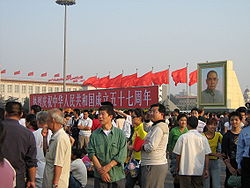- National Day of the People's Republic of China
-
National Day of the People's Republic of China Observed by All of the  People's Republic of China including Hong Kong and Macau
People's Republic of China including Hong Kong and MacauType Historical, cultural, nationalist Date October 1 (7-day holiday) Celebrations festivities, including fireworks and concerts  Tiananmen Square, 2006 National Day of the PRC. The placard reads "Warmly celebrate the 57th anniversary of the founding of the People's Republic of China". The portrait is that of Sun Yat-sen.[1]
Tiananmen Square, 2006 National Day of the PRC. The placard reads "Warmly celebrate the 57th anniversary of the founding of the People's Republic of China". The portrait is that of Sun Yat-sen.[1]
The National Day of the People's Republic of China (simplified Chinese: 国庆节; traditional Chinese: 國慶節; pinyin: guóqìng jié) is celebrated every year on October 1. It is a public holiday in the People's Republic of China to celebrate their national day.[2]
The PRC was founded on October 1, 1949 with a ceremony at Tiananmen Square. The Central People's Government passed the Resolution on the National Day of the People's Republic of China on December 2, 1949 and declared that October 1 is the National Day.[3]
The National Day marks the start of one of the two Golden Weeks in the PRC. However, there have been some recent controversies over whether Golden Weeks should be kept.
The National Day is celebrated throughout mainland China, Hong Kong, and Macau with a variety of government-organised festivities, including fireworks and concerts. Public places, such as Tiananmen Square in Beijing, are decorated in a festive theme. Portraits of revered leaders, such as Mao Zedong, are publicly displayed.[4]
The University of Southern California U.S.-China Institute published a review of national day celebrations between 1949 and 1999 and discussed preparations for the 2009 extravaganza.[5] US-China Today summarized press coverage and included images of the 2009 celebration.[6]
Fireworks display
A fireworks display is usually held nationwide in all cities, including Hong Kong, where a fireworks display to celebrate the National Day of the People's Republic of China has been held since 1997 at Victoria Harbour in the evening. Many parades occur in the city of Beijing and some are very large.[7]
See also
- National Day
- National Day of the Republic of China
- History of the People's Republic of China
- 60th anniversary of the People's Republic of China
References
- ^ China at 60: Nostalgia and progress | Fu Ying | Comment is free. The Guardian (2008-07-16). Retrieved on 2011-04-30.
- ^ Flag-raising ceremony held for China's National Day celebration_English_Xinhua. News.xinhuanet.com (2009-10-01). Retrieved on 2011-04-30.
- ^ National Day celebrated across China _English_Xinhua. News.xinhuanet.com (2009-10-01). Retrieved on 2011-04-30.
- ^ Fri, Oct 02, 2009 – China celebrates with elaborate display of power and ideology. The Irish Times (2009-10-10). Retrieved on 2011-04-30.
- ^ US-China Institute :: news & features :: 60 years of celebrating the creation of the people's republic. China.usc.edu. Retrieved on 2011-04-30.
- ^ http://www.uschina.usc.edu/ShowFeature.aspx?articleID=4505
- ^ China oozes confidence about future. Usatoday.Com (2009-10-02). Retrieved on 2011-04-30.
 Public holidays in the People's Republic of China
Public holidays in the People's Republic of ChinaGolden Weeks Other Holidays Categories:- Chinese holidays
- National days
- October observances
Wikimedia Foundation. 2010.

